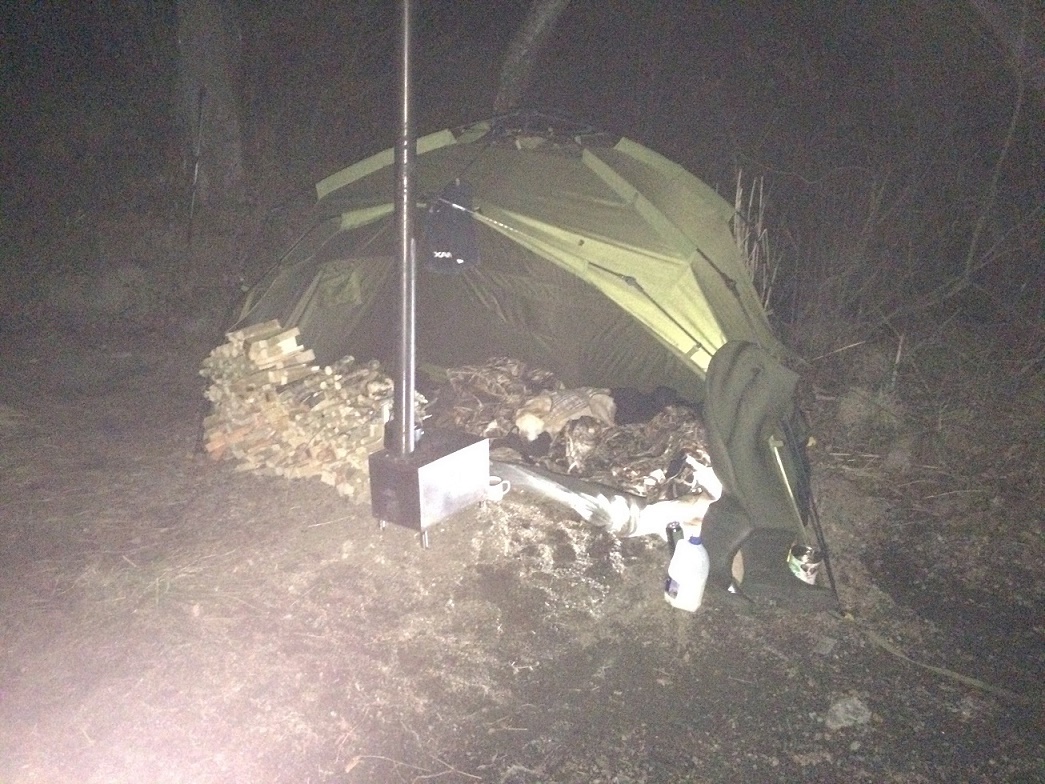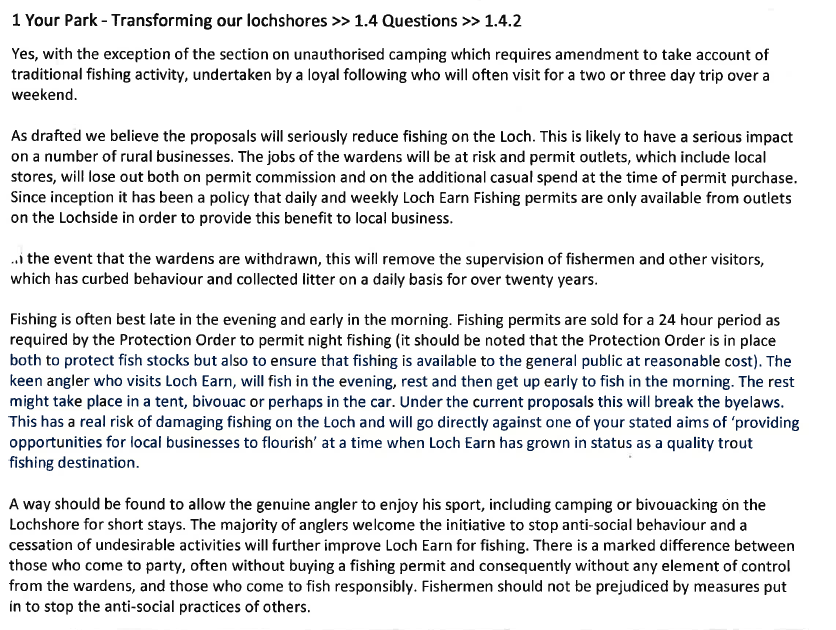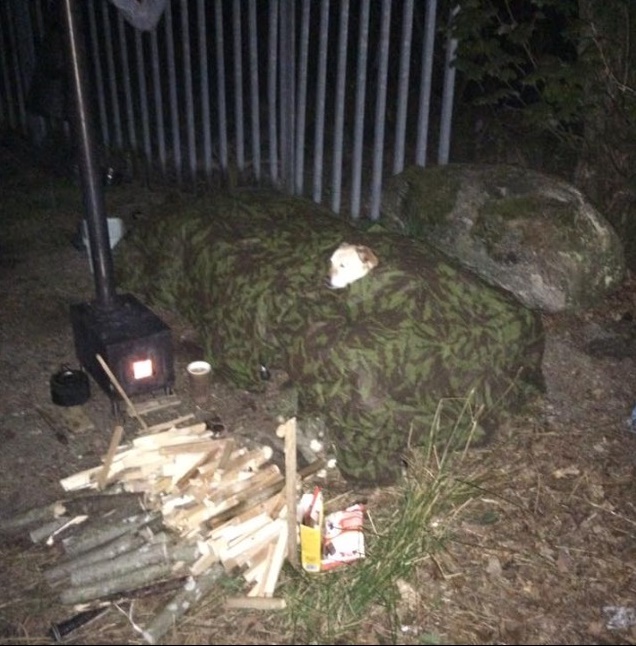
The “enforcement” of the camping byelaws
Over the last couple of months its become clear that the Loch Lomond and Trossachs National Park’s Ranger service are not referring anyone to the Procurator Fiscal for breach of the byelaws. On the one hand this is because the byelaws are almost impossible to enforce against campervans, on the other because current parkspin is that the National Park is not against campers. If the Park were to refer a camper, camping according to the Scottish Outdoor Access Code, to the Procurator Fiscal that would be a public relations disaster. The LLTNPA therefore appear to have agreed to leave referrals to the PF to the police, including the police officer seconded to the Park and whom they employ.
The good news about this therefore is that if campers simply ignore the permit zones and go camping, there appears little immediate risk of prosecution. The worst that is likely to happen is the Rangers will threaten to call the police and if the police do come out – they normally have better things to do than harassing innocent campers – there is some evidence that they are likely to give you another chance to leave. For the confident overnight camper therefore there are indications that the camping byelaws have lost their bite. The LLTNPA though is relying on the fear factor – the fear of a £500 fine and criminal record – to deter campers. Once this goes, the byelaws will be close to collapse.
Anglers and the byelaws
The position of anglers however is very different because they tend to stay in one spot for day after day. In fact the whole camping byelaw system appears to have been designed to prevent people from fishing in the way they used to, pitching a tent on the loch shores for a few nights or more. To illustrate this I will consider the case of an angler, who I will call Mr Trout, because that is his passion, who has been summonsed to appear in Court for allegedly occupying a shelter in breach of the camping byelaws.
The byelaws make it an offence to:

Mr Trout has been fishing on Loch Earn for 15 years and when I say fishing, we are talking about serious fishing, where he stays up all night (because that is the best time to catch ferox trout) through wind and rain for a period of several weeks each year. Its what he did on his holidays and he has been going from the 15th March each year. It sounds just as tough as being tied to a belay in winter and waiting while your mate negotiates their way inch by inch up the next pitch. Anyway, what he used to do, with the agreement of the estate who sold him the fishing permit, was pitch his tent close to the shore and retreat there to keep warm overnight and then sleep in the day. It also meant he could keep an eye on his (expensive) tent while fishing.
The place he wants to fish – he has been going to the same place for 15 years – is not in a permit zone but, even if it was, that would be little help to him because he fishes for at least a week at a time and the permits create a new offence of returning to a permit zone after three nights (the wording makes it an offence for you to walk back into the zone after the third night, in other words the LLTNPA have criminalised access and not just camping). Further, when he asked the LLTNPA, they told him they could not guarantee the safety of his tent when it was unattended. This does not surprise me but splitting people from their tents is just another petty and stupid consequence of the byelaws.
This impact on anglers was well put by Drummond Estates, which own the north shore of Loch Earn where Mr Trout fishes, in their response to the Your Park consultation, a response with the LLTNPA ignored:

Mr Trout’s response to the camping byelaws
This year, instead of camping where he normally did, Mr Trout found a place to pitch his tent just outside the camping management zone which was hidden from general view. He was able to go there during the day to sleep. Inconvenient, but just about manageable because the camping management zone along Loch Earn is quite narrow. His difficulty, however, was how to keep himself, and his dog which accompanied him on all his trips, warm at night while fishing. Unlike some other anglers he does not have a van – and one of the anomalies of the byelaws is if he had a van and been able to drive it onto the beach below, he could have quite lawfully sheltered in that (the offence is to go to sleep in a van off the road network).
After discussion with Rangers he was told it was acceptable to put up an open shelter so that is what he did:

However, this was of limited use in the rain and wind and he then put up a shelter, the sort of shelter which, if used by fisheries scientists working at night, might be called personal protective equipment (see top photo). Many fishermen have such shelters and prior to the byelaws would retreat to these while fully clothed to get warm. The camping byelaws made this an offence – its an offence to occupy a shelter. That provision of the byelaws was specifically targetted at anglers, as they form the vast majority of people who shelters rather than tents. Hence the response from Drummond Estates to the camping byelaw consultation.

In early April, Mr Trout came to the attention of the Park’s police officer, PC Barr. Unlike the Rangers, who had been prepared to be flexible, the Park’s police officer was not, told him the shelter had to be removed and, according to Mr Trout, suggested he buy an open sided umbrella (which is allowed under the byelaws). That’s not much use for keeping people or a dog warm. The police then came back the next night and charged him for occupying a shelter.
Now, you might think, Mr Trout was given a warning – and the fact he was suggests the risk of people who stay only one night being charged is very low – so he got what he deserved.
I see it another way. Mr Trout was standing up for his right to fish, for the rights of all anglers, and if found guilty, the rights of a whole section of the population to enjoy their activity (which they pay for) will have been removed. That the police are pursuing people like this seems to me a complete waste of police resources. Indeed, one wonders if the police would ever pursue cases like this unless one of their number, PC Barr, was employed by the National Park Authority. Anglers are, pardon the phrase, sitting ducks when faced with people determined to enforce the byelaws.
The LLTNPA appears to be prejudiced against anglers. What they have done is lumped together two groups of people, serious anglers who care about and are extremely knowledgeable about the countryside (they have to be to catch fish) and groups of people who may have fishing rods but whose main intention is to party. I have talked to a water bailiff about this who says the people who have fishing permits are not the problem. They often, like Mr Trout, visit the same places year after year and have good relationships with the bailiffs (who are also fisherman). By contrast the people who leave rubbish and party and come under anti-social behaviour legislation are unlikely to have fishing permits. The Park though, instead of joining forces with the water bailiffs – and unlike Rangers water bailiffs have significant powers, include powers of arrest – has ignored.
Instead of prosecuting responsible anglers, or anyone else who camps according to the Scottish Outdoor Access Code for that matter, the Park should have been engaging with those people and using them as allies to tackle the few people who do behave irresponsibly. Mr Trout is due to go to court in August and it will be interesting to see what happens. The outcome will have wide significance for everyone who wants to be able to enjoy the countryside responsibly. Apart from the specifics of the case, prosecuting responsible anglers is I believe in breach of the Park’s statutory duty to promote public enjoyment and understanding of the countyside.

Excellent read, I too am a very keen responsible angler with conservation at the centre of my quarry. The majority of anglers are law abiding people with an acute attitude to the outdoors and there surroundings. I hope Mr Trout makes these people,come to there senses and works with us and not against us. I’m personally at my wits end with what has happened and feel to that I am being singled,out for something that I love doing. The whole bye law thing is totally anti anglers imo
Ridiculous that this man will have a criminal record if found guilty. No holidays abroad etc etc …. outrageous. I think a protest on the court day is called for to highlight this stupidity.
Firstly, I don’t see how any body other than the police force can “employ” a police officer, I would say that contradicts the impartiality the law demands.
As for the laws themselves, we here in Scotland are blessed with right of access laws, meaning except for privately owned property ( houses building/ construction sites and fields growing crops and a couple more) there are effectively no trespass laws along as we behave responsibly.
The Land Reform (Scotland) Act 2003 (which came into force in 2005) gives everyone rights of access over land and inland water throughout Scotland, subject to specific exclusions set out in the Act and as long as they behave responsibly. These rights are sometimes referred to as ‘freedom to roam’.
No mention of short stay camping on the “specific exclusions” list, that I can see, however I’m half blind.
I have travelled the country fishing on various waters and have seen, on more occasions than I would hope to see, the devastation the minority can cause on our beautiful landscape, but these issues should be dealt with case by case. The LLTNPA should be employing more bailiffs (not police officers) to enforce permit rules and to monitor and report any instances of disrespect or destruction of sites.
Most of this is my personal opinion and as such, is open for debate or to be debunked completely but a lot of what I have written Is outlined in the link below.
https://www.scotways.com/faq/law-on-statutory-access-rights
All sounds plausible.
But here’s the reality.
Most campers behave responsibly.
Most anglers behave responsibly.
In both groups there is a minority group that behave destructively and anti-socially.
There is/was legislation to deal with the problem but it is/was difficult to enforce.
The intent of the Byelaws is to improve the powers of Rangers/Police to manage the problems.
More for the Rangers as the Police have other things to do … Murder, Assault, Robbery, …. Parking….
I am genuinely torn between the Bye laws and the right to roam.
But the right to roam is not the right to Trash